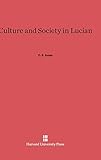Culture and Society in Lucian / C. P. Jones.
Material type: TextPublisher: Cambridge, MA : Harvard University Press, [2013]Copyright date: ©1986Edition: Reprint 2014Description: 1 online resource (195 p.)Content type:
TextPublisher: Cambridge, MA : Harvard University Press, [2013]Copyright date: ©1986Edition: Reprint 2014Description: 1 online resource (195 p.)Content type: - 9780674181311
- 9780674181328
- Athènes (Grèce) dans la littérature
- Athènes (Grèce) dans la littérature
- Civilisation gréco-romaine dans la littérature
- Civilisation gréco-romaine dans la littérature
- Civilization, Greco-Roman, in literature
- Dialogues, Greek
- Griechische Literatur
- Grieks
- Klassieke oudheid
- Literature
- Maatschappij
- Rome dans la littérature
- Rome dans la littérature
- Satire, Greek
- Satires
- Athens (Greece) -- In literature
- Civilization, Greco-Roman, in literature
- HISTORY / General
- Lucian, of Samosata -- Criticism and interpretation
- Rome -- In literature
- HISTORY / General
- 887/.01
- PA4236
- online - DeGruyter
| Item type | Current library | Call number | URL | Status | Notes | Barcode | |
|---|---|---|---|---|---|---|---|
 eBook
eBook
|
Biblioteca "Angelicum" Pont. Univ. S.Tommaso d'Aquino Nuvola online | online - DeGruyter (Browse shelf(Opens below)) | Online access | Not for loan (Accesso limitato) | Accesso per gli utenti autorizzati / Access for authorized users | (dgr)9780674181328 |
Frontmatter -- Preface -- Contents -- Abbreviations -- 1. Introduction: The Modern Lucian -- 2. Lucian in Society -- 3. Philosophy and Philosophers -- 4. Gods and Oracles -- 5. Credulity and Fiction -- 6. The Writing of History -- 7. The Court of Lucius Verus -- 8. Rome -- 9. Demonax and Sostratos -- 10. Concealed Victims -- 11. Peregrinus of Parion -- 12. Alexander of Abonuteichos -- 13. Culture and Society -- APPENDIX A: Crepereius Calpurnianus -- APPENDIX Β: Chronology -- APPENDIX C: Disputed Works -- Bibliography -- Index
restricted access online access with authorization star
http://purl.org/coar/access_right/c_16ec
The works of the second-century satirist Lucian--of which about seventy survive--have had a marked influence on western literature since the Renaissance. Translated by Erasmus, and called "inimitable" by Gibbon, Lucian is the first to tell the famous story of the Sorcerer's Apprentice. His subjects range from the hypocrisy of philosophers to fantastic voyages in space. He is often thought the true father of science fiction and, at the same time, is one of the most important witnesses to early Christianity. C. P Jones examines Lucian's work, setting this brilliant writer in the social and intellectual context of an age that proved pivotal in Greco-Roman history. Lucian's art has been widely considered bookish, concerned with people and customs he and his readers knew only from literature. Jones argues that on the contrary his attacks on such targets as mercenary Stoics and the snake-god Glycon were aimed with mischievous precision. The result is a fresh portrait of Lucian and a vivid picture of a society whose outward assurance masked uncertainty and the onset of profound change.
Mode of access: Internet via World Wide Web.
In English.
Description based on online resource; title from PDF title page (publisher's Web site, viewed 29. Nov 2021)


